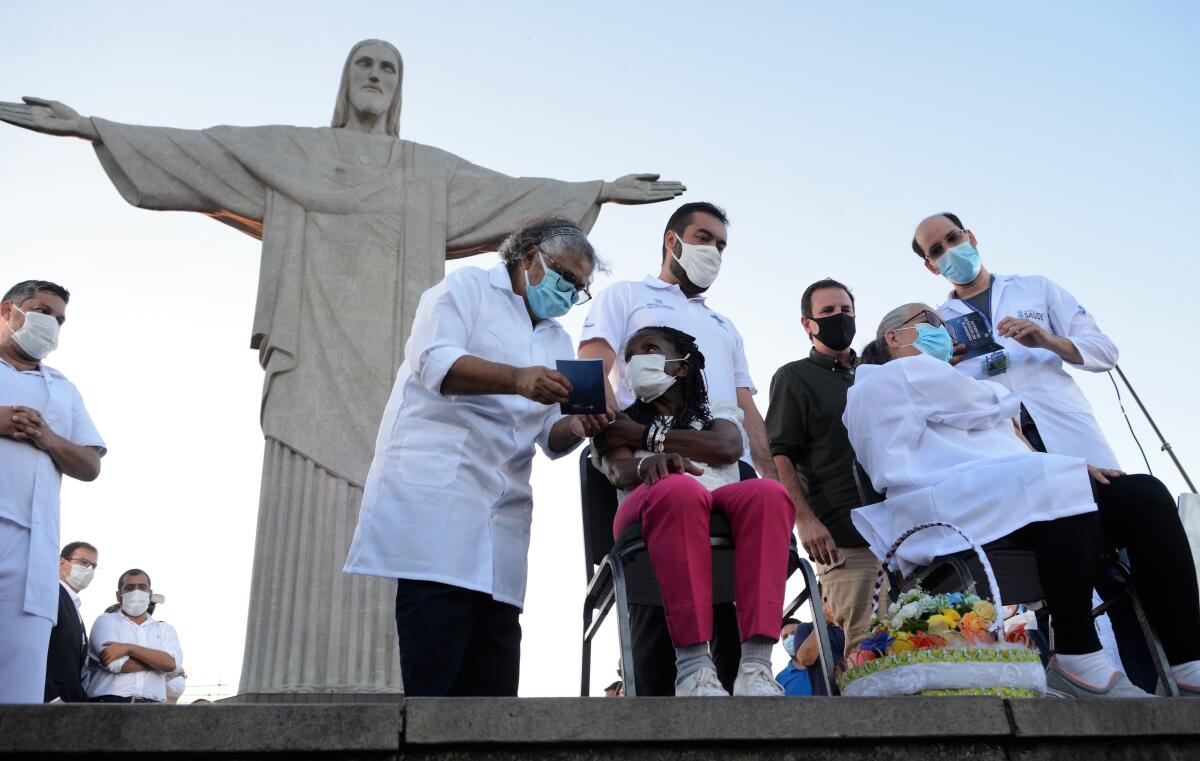First detection of Brazil coronavirus variant in U.S. found in Minnesota case

- Share via
MINNEAPOLIS — A new Brazilian variant of the coronavirus has made its first known appearance in the United States in a person who recently returned to Minnesota after traveling to Brazil, state health officials announced Monday.
The Brazil P.1 variant was found in a specimen from a patient who lives in the Minneapolis-St. Paul area who became ill in the first week of January, the Minnesota Department of Health said in a statement. Epidemiologists are interviewing the person to obtain more details about their illness, travel and contacts.
There was no immediate indication that the variant was spreading in Minnesota.
Viruses are constantly mutating, and new versions — called variants — often emerge. Health officials are also worried about variants that were first reported in the United Kingdom and South Africa. Researchers believe they may spread more easily than the virus that has already sickened millions in the United States and caused nearly 420,000 deaths.
The Brazilian variant was first identified in four travelers who were tested at an airport outside Tokyo. It contains a set of mutations that may affect its ability to be recognized by antibodies, according to the U.S. Centers for Disease Control and Prevention.
The Minnesota Department of Health has a program that conducts regular surveillance for variants, testing 50 random samples from University of Minnesota laboratories weekly. State Health Commissioner Jan Malcolm said the new finding underscores the importance of testing as well as continued efforts to limit the spread of the disease.
“We know that even as we work hard to defeat COVID-19, the virus continues to evolve as all viruses do,” Malcolm said in a statement. “That’s yet another reason why we want to limit COVID-19 transmission — the fewer people who get COVID-19, the fewer opportunities the virus has to evolve. The good news is that we can slow the spread of this variant and all COVID-19 variants by using the tried-and-true prevention methods of wearing masks, keeping social distance, staying home when sick, and getting tested when appropriate.”
Some researchers have raised a concern that people who have already been infected with COVID-19 could be reinfected with the Brazilian variant.
If that should be confirmed, “that would be disturbing,” said Dr. William Schaffner, an infectious disease specialist at Vanderbilt University.
The CDC has reported at least 195 cases of the U.K. variant in the United States. Those reports have come from at least 22 states, including eight in Minnesota. The South African variant has not been discovered in the United States. Last week, the World Health Organization urged a greater effort to detect new variants.
President Biden on Monday reinstated COVID-19 travel restrictions on most non-U.S. travelers from Brazil, the U.K. and South Africa. Experts had predicted it was only a matter of time before the Brazilian and South African variants appeared in the U.S.
It makes sense that it would be first spotted in Minnesota, which has lab capabilities beyond those available in other states, Schaffner said. That means it may already be present elsewhere in the U.S., but simply hasn’t been identified yet, he said.
The CDC has said that the U.K. variant may become dominant in the U.S. by March. Although it doesn’t cause more severe illness, it will lead to more hospitalizations and deaths just because it spreads much more easily, the CDC said, warning of “a new phase of exponential growth.”
Scientists last week reported preliminary but troubling signs that some recent mutations may modestly curb the effectiveness of two current vaccines, although they stressed that the shots still protect against the disease. And there are signs that some of the new mutations may undermine tests for the virus and reduce the effectiveness of certain treatments. Some tests suggest the South African and Brazilian variants may be less susceptible to antibody drugs or antibody-rich blood from COVID-19 survivors, both of which help people fight off the virus.
Health officials also worry that if the virus changes enough, people might get COVID-19 a second time. Reinfection is rare, but Brazil has confirmed a case in someone with the new variant who had been sickened with a previous version several months earlier.
More to Read
Sign up for Essential California
The most important California stories and recommendations in your inbox every morning.
You may occasionally receive promotional content from the Los Angeles Times.










